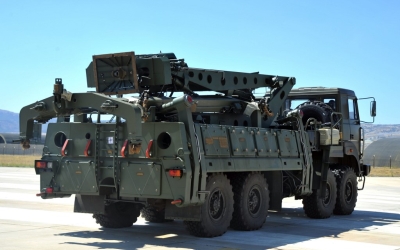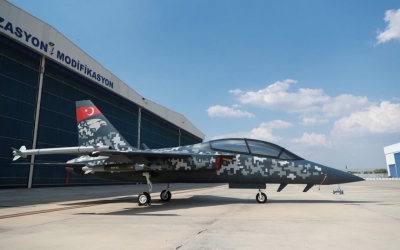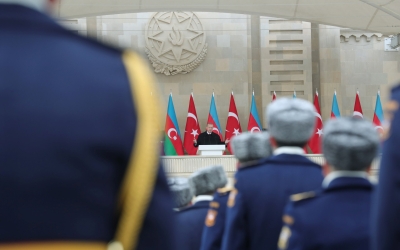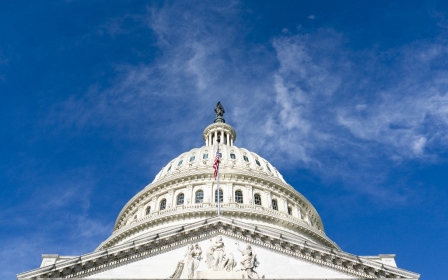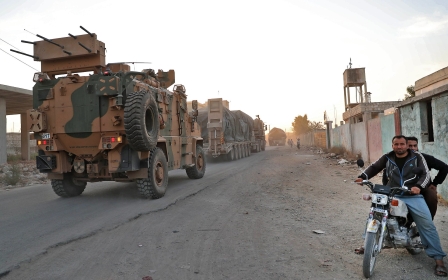'What kind of an alliance is this?' Turkey's Erdogan slams US over sanctions

Turkey's President Recep Tayyip Erdogan responded on Wednesday to US sanctions against Ankara over its purchase of a Russian missile defence system, calling Washington's move an "open attack" on its sovereignty.
The United States levied sanctions against an agency within Turkey's Ministry of National Defence, along with several agency officials, on Monday over the country's acquisition and activation of a Russian-made S-400 missile defence system.
New MEE newsletter: Jerusalem Dispatch
Sign up to get the latest insights and analysis on Israel-Palestine, alongside Turkey Unpacked and other MEE newsletters
The sanctions, required under a 2017 law that aims to limit Russia's military influence, were lighter than had been feared, but Erdogan noted that they had never before been used against a fellow member of Nato.
"Sanctions are imposed on our country, a Nato member. What kind of an alliance is this?" Erdogan asked during a televised speech in Ankara.
"This decision is an open attack on our sovereignty."
Washington had already punished Ankara in July by barring it from developing parts for and acquiring America's next-generation F-35 fighter jets.
This week's punitive measures against the Presidency for Defence Industries (SSB), the country's military procurement agency, included a ban on all US export licences and loan credits for the agency.
Its president, Ismail Demir, and three other executives were also barred from travel to or holding assets in the US.
The State Department said the sanctions "are not intended to undermine the military capabilities or combat readiness of Turkey... but rather to impose costs on Russia in response to its wide range of malign activities".
'They pulled the sanctions trigger'
But in his first public comments about the sanctions, Erdogan called them unjust.
He reiterated Turkey's claim that Washington would not sell the US equivalent to the S-400, the Patriot, to Ankara.
US officials have repeatedly said that Turkey was offered the American system, but that those negotiations broke down after Ankara demanded to also obtain proprietary production and operations data - trade secrets - about the Patriots.
"The more Turkey grows, the more Turkey inches closer to its goals, the more it stands up for its sovereign rights, the more it is subjected to attacks," Erdogan said during Wednesday's address.
"Because we met our needs somewhere else, they pulled the sanctions trigger."
Since the S-400 defence system has the ability to "learn" flight patterns and other data about aircraft flying overhead, Washington views a Nato ally buying the Russian defence system as a security threat and had previously asked Ankara to pull out of the deal. It also has concerns over Turkey providing funds to the Russian defence industry via the purchase.
Erdogan said Turkey offered to resolve the issue through diplomacy and would now redouble its efforts to further develop its arsenal.
"To make our defence industry independent, we will work twice as hard, we will accelerate our defence industry agency's projects, we will give more support to our defence-related companies," he said.
Going forward
The threat of sanctions has weighed on the lira currency, alongside a spike in inflation and worries about foreign reserves. The currency hit a series of record lows this year and in November was down almost 24 percent from the previous year.
Markets saluted the sanctions package on Monday, as it wasn't as severe as expected. Turkish military analysts were, however, concerned by the impact the penalties may have on the defence sector, which recorded total sales of more than $10bn last year.
The most crucial part of the sanctions was the export licencing ban placed on SSB. Still, Demir, the organisation's president, said on Monday that his agency had been preparing for this scenario.
The sanctions are only the latest manifestation of a series of rifts between the two countries, with the Nato allies also in disagreement over Syria, Libya and the eastern Mediterranean Sea.
While Trump has had mostly warm ties with Erdogan, hostility among US legislators towards Turkey has been growing amid its increasingly aggressive foreign policy.
Meanwhile, President-elect Joe Biden, who once described Erdogan as an "autocrat", is expected to be tougher on Turkey than his predecessor.
Middle East Eye delivers independent and unrivalled coverage and analysis of the Middle East, North Africa and beyond. To learn more about republishing this content and the associated fees, please fill out this form. More about MEE can be found here.


